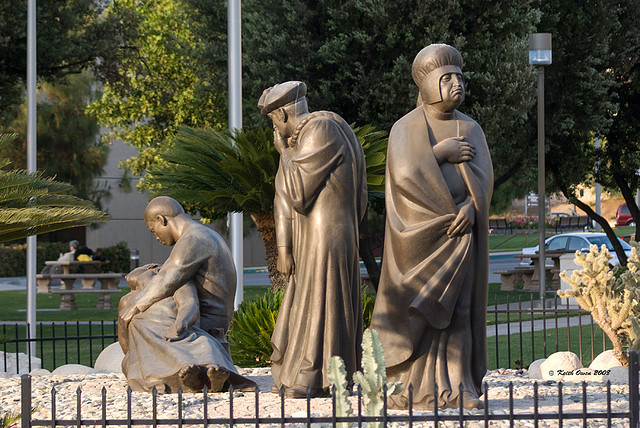Abraham led a church without the trappings we’ve come to associate with churches. No theology; no liturgy. His membership oscillated hither thither, depending on which child he wanted to keep and which he wanted to send away. His only constant flock was his wife. His three hundred odd slaves did not buy into his God; God remained at best, the God of their master – not theirs. He had nothing with which to expiate his sins; no blood of Jesus for him since he pre-dated Jesus, and no blood of bull either because his sacrificial system was more situational than institutional; they were merely markers of divine encounters, no more.

If the teaching in the Epistle to the Hebrews is anything to go by, Abraham had no hope in hell of salvation: No blood of Jesus, no name of Jesus, no hope. [1]Hebrews 9:11-28 Except of course Jesus seemed to think otherwise. His parables placed Abraham in the bosom of the Lord with eternal life to boot; and that, before the death and resurrection of the Lord. So how did Abraham achieve that which Christian scriptures say could be gained by the grace that is to be found only in Christ Jesus? Jesus said ‘I’m the way the truth and the light, no one cometh to the father but by me.’ [2]John 14:6 Considering that David who lived before Jesus had a very personal and lively relationship with God, something must be lost in translation.
One way to approach this is to conclude that those who lived before Christ were under a different dispensation. Tempting but simplistic. Revealed word tells us no such dispensation existed because there was no time before Jesus. In the beginning, we are told, was the word. [3]John 1:1 For the avoidance of doubt, Jesus himself said “Abraham rejoiced to see my day: and he saw it, and was glad”. [4]John 8:56
If the teaching in the Epistle to the Hebrews is anything to go by, Abraham had no hope in hell of salvation: No blood of Jesus, no name of Jesus, no hope.
So as it appears Abraham knew the Lord. He walked with the Lord. He ate with the Lord. He just didn’t know the Lord as Jesus. He didn’t build a church in that name; he didn’t construct any religious doctrine around that name. No missions, cathedrals nor memorials; no creed nor oaths, no sacrament of service nor order of worship. All he had were revelations and a commission to teach his children to walk in the way of the Lord, that is, to do justice and judgement. [5]Genesis 18:19 That was his assignment. Along the way he entertained strangers and fought to deliver captives. He put others first and gave peace a chance. He insisted that all, including God, must be fair. Those characteristics defined him. Somewhere in his struggles with God and man, Jesus lurked – pre-three wise men, pre-Herod, pre-Pontius Pilate and pre-confession of faith and apostolic creed.
The lesson of Abraham from the words of Jesus is far reaching. Abraham did good for goodness sake and that was sufficient for Christ. It teaches about the possibility of a relationship with Jesus outside of organised religion. When Jesus said He knew Abraham, His audience was confounded enough to resort to silliness. They were fixated on the historical Jesus just as the Christian church does today. There is however, more to Jesus than the son of a carpenter who offended and amazed in equal measure. There’s a lot more to him than crucifixion, resurrection and ascension. There’s in fact too much of him for the Christian church or any organised collective to possess. Abraham’s is not the only possibility of a godly life without the knowledge of or relationship with the historical Jesus. Arch Bishop Desmond Tutu cited the prophets who were filled with the Holy Spirit and taught the world the way of the Lord before the day of Christian Pentecost:
“’No one can come to the Father but by me’ need not be interpreted to refer only to the incarnate Logos, for there was also the pre-existent logos, as the gospel of John attests [6]John 1:1. This would then mean that the pre-incarnate logos would lead people to the knowledge of God, a revelatory activity that antedates Christianity. Does not Hebrews assert that God in sundry times and in diverse manners spoke to the fathers in the past through the prophets”. [7]Hebrews 1:1
It is on that argument we are able to conclude that Joseph knew Jesus going by his capacity to forgive, as did, in their different ways, Samuel, Hannah, Ruth, Jehoshaphat, Hezekiah, Ezra the scribe, Nehemiah and the Joshuas, the sons of Nun and Josedech, to name a few. In fact the epistle to the Hebrews lauded Rahab the harlot for achieving with faith what many a pastor could only dream of. All these people lived before Christ, but their lives and the choices of some like Ruth who was willing to devote her future to comforting a bereaved old woman became the stuff of canon.
The lesson of Abraham from the words of Jesus teaches about the possibility of a relationship with Jesus outside of organised religion.
The Lord envisioned some people going about doing charitable works. They fed the hungry and clothed the naked. They brought the destitute into their homes and comforted the afflicted. When they stood before Christ he thanked them for all they did for him. ‘Beg your pardon,’ they said. ‘When did we ever do anything for you?’ [8]Matthew 25:31-46 If they were Christians they wouldn’t answer him in that manner. We’re taught to do everything as though we did them for the Lord. [9]Colossians 3:23 The reason they would wonder why he said that was because he wasn’t on their radar in all their labours. They did good for the sake of good. And it was sufficient for Jesus.
To a certain Christian mindset, this is unthinkable. They prefer to liken righteousness outside of Jesus to ‘filthy rags’. Good works they say should be the expression of our gratitude for the grace that Jesus gave to the world. We were all concluded under sin, they quote St Paul; and, therefore, no appreciable goodness could issue out of us except we’re bathed in the blood of grace. Utter tosh, scripture seems to reply. The angel of God assured Daniel of his place in God at the end of days and that was at least 500 years before Jesus. [10]Daniel 12:13
A large number of churches place a higher premium on ‘faith in Christ’ as a token of spiritual transaction than the words of Christ. We therefore have generations that believe that all that is necessary for salvation is to confess him as Lord. They didn’t pluck this from the air, of course. It’s contained in St Paul’s epistle. [11]Romans 10:9 But St Paul didn’t quote Christ much. If he consulted the words of Christ enough, he might have reminded his churches that Christ said: “Not every one that saith unto me, Lord, Lord, shall enter into the kingdom of heaven; but he that doeth the will of my Father which is in heaven”. As C.S. Lewis wrote in Mere Christianity: “…if what you call your ‘faith’ in Christ does not involve taking the slightest notice of what he says, then it is not faith at all – but only an intellectual acceptance of some theory about him.”
A large number of churches place a higher premium on ‘faith in Christ’ as a token of spiritual transaction than the words of Christ.
Jesus did not appear to care much for people hopping on the salvation train by profession or confession. He envisioned a number of people who thought their salvation was a given because they were engaged all their lives calling him ‘Lord’ and glorifying his name with miraculous works. They were wrong. He said he never knew them. [12]Matthew 7:21-23 Neither did the people of ‘faith’ impress in the story of The Good Samaritan. It was the stranger; the compassionate other. One who at that time did not belong to the ‘congregation of God’. In fact the ‘people of God’ did not associate with the Samaritans at that period. [13]John 4:9 There are people out there who ‘know’ Jesus without buying into any theology. God tells us through the prophets what it means to know him: “He judged the cause of the poor and needy…was not this to know me? saith the Lord”. [14]Jeremiah 22:16 The knowledge of him is demonstrated in works of righteousness and not in the form of bums in pews. “Pure religion, undefiled before God and the Father, is this: to visit the fatherless and widows in their affliction, and to keep himself unspotted from the world.” [15]James 1:27
Worship, tithing and offering without a care in the world for the weak, the poor, the deprived, the destitute, the hurting, the lonely, the abused, the sick, the downtrodden and those societies consign to the fringe, are without value. [16]Isaiah 1: 10-17 Confession and profession of faith without due regard to works Jesus loves avail nothing. [17]Luke 6:46


